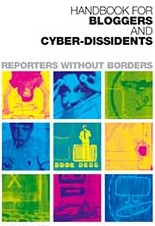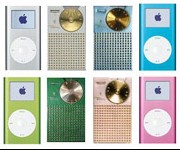| |

|
Friday, 23 September 2005
|
|
Sorry this news is a week old (nearly), but last Friday at the Flinders Uni Tavern, Mister Fiction, all but the singer, students at Salisbury TAFE, won the state finals of the National Campus Band Competition, having won the TAFE heats and final.
They won a range of prizes, and now go on to the national final at the Adelaide Uni Bar.
This is a big deal. If they win, they will almost certainly be signed. They may be anyway. Jebediah and George came to national prominence throught this comp.
The other TAFE band (not an official TAFE band, but made up of students), The Battery Kids, acquitted themselves well.
Mister Fiction's bass player Clint Wylie, told me that he thought the TAFE
bands had an advantage due to their training. It was a condition of the
competition that all bands use the same equipment supplied by sponsor Derringers Music. All the Uni bands (two from each of Flinders, Adelaide, UniSA) had terrible trouble getting acceptable sounds. The TAFE musicians are used to using their own gear, and a wide variety of TAFE
gear, and pulling good sounds quickly as they perform each week in
Concert Practice. Clint thought this meant that they weren't fazed by
the unfamiliar kit, and just got down to pulling a good sound and doing
their set.
10:43:45 PM 
|
|
|
Cory Doctorow:
Reports Without Borders has shipped a free guide for "Bloggers and
Cyber-Dissidents" on publishing anonymously without getting fired,
imprisoned or executed.
 Bloggers
need to be anonymous when they are putting out information that risks
their safety. The cyber-police are watching and have become expert at
tracking down "trouble- makers." This handbook gives advice on how to
post material without revealing who you are ("How to blog anonymously,"
by Ethan Zuckerman). It's best of course to have the technical skills
to be anonymous online, but following a few simple rules can sometimes
do the trick. This advice is of course not for those (terrorists,
racketeers or pedophiles) who use the Internet to commit crimes. The
handbook is simply to help bloggers encountering opposition because of
what they write to maintain their freedom of expression. However, the
main problem for a blogger, even under a repressive regime, isn't
security. It's about getting the blog known, finding an audience. A
blog without any readers won't worry the powers-that-be, but what's the
point of it? This handbook makes technical suggestions to make sure a
blog gets picked up by the major search-engines (the article by Olivier
Andrieu), and gives some more "journalistic" tips about this ("What
really makes a blog shine," by Mark Glaser). Bloggers
need to be anonymous when they are putting out information that risks
their safety. The cyber-police are watching and have become expert at
tracking down "trouble- makers." This handbook gives advice on how to
post material without revealing who you are ("How to blog anonymously,"
by Ethan Zuckerman). It's best of course to have the technical skills
to be anonymous online, but following a few simple rules can sometimes
do the trick. This advice is of course not for those (terrorists,
racketeers or pedophiles) who use the Internet to commit crimes. The
handbook is simply to help bloggers encountering opposition because of
what they write to maintain their freedom of expression. However, the
main problem for a blogger, even under a repressive regime, isn't
security. It's about getting the blog known, finding an audience. A
blog without any readers won't worry the powers-that-be, but what's the
point of it? This handbook makes technical suggestions to make sure a
blog gets picked up by the major search-engines (the article by Olivier
Andrieu), and gives some more "journalistic" tips about this ("What
really makes a blog shine," by Mark Glaser).
Some bloggers face the problem of filtering. Most authoritarian
regimes now have the technical means to censor the Internet. In Cuba or
Vietnam, you won't be able to access websites that criticise the
government or expose corruption or talk about human rights abuses.
So-called "illegal" and "subversive" content is automatically blocked
by filters. But all bloggers need free access to all sites and to the
blogosphere or the content of their blogs will become irrelevant.
Link
(via Copyfight) [Boing Boing]
10:03:00 PM 
|
|
|
this song is that the title, She's too good for me,
which could be read as ironic, and of course isn't, would be expected
to be the hook. But the line does not even appear in the song!
Instead, the title is turned around to "I'm not good enough for her",
which I think is so much more poignant, and, of course, does not mean
exactly the same thing.
Warren Zevon's
voice is also extremely moving. Never a great singer, he was already
dying of lung cancer when this was recorded, so his voice is weak,
reedy, and tremulous. I just love it.
9:52:40 PM 
|
|
|
Cory Doctorow:
The BBC has a great story on a pioneering 1954 transistor radio that
bears a striking resemblance to the iPod in form, disruptiveness and
marketing.
 The
Regency TR-1 transistor radio, made in 1954, had a decent claim to be a
genuine piece of innovation, however. It was, by popular agreement, the
world's first commercially sold transistor pocket radio. The
Regency TR-1 transistor radio, made in 1954, had a decent claim to be a
genuine piece of innovation, however. It was, by popular agreement, the
world's first commercially sold transistor pocket radio.
Small enough to hold in your hand, and powered by batteries, it
came in a variety of delicious colours, including green, pearlescent
blue, lavender, white and red.
The device went on sale just in time for hip young gadget
freaks to hear Elvis Presley singing That's All Right - recognised by
many as the moment at which rock'n'roll was born.
The TR-1 was marketed under the slogan "See it! Hear it! Get it!"
Link
(Thanks, Mike!) [Boing Boing]
1:00:39 AM 
|
|
|
The final credits are rolling for film, writes Fran
Molloy, but there are plenty of people determined to hang on till
the end.
[The Age Technology Headlines]
12:02:28 AM 
|
|
|

|
© Copyright 2005 Peter Nixon.
Last update: 2/10/05; 8:13:43 AM.
|
|
|